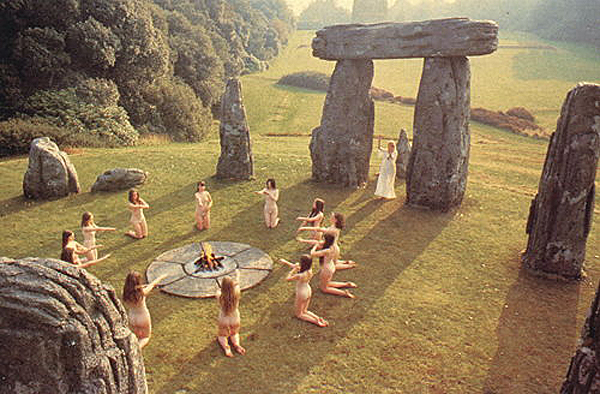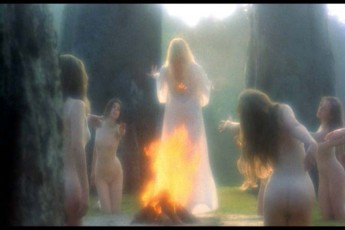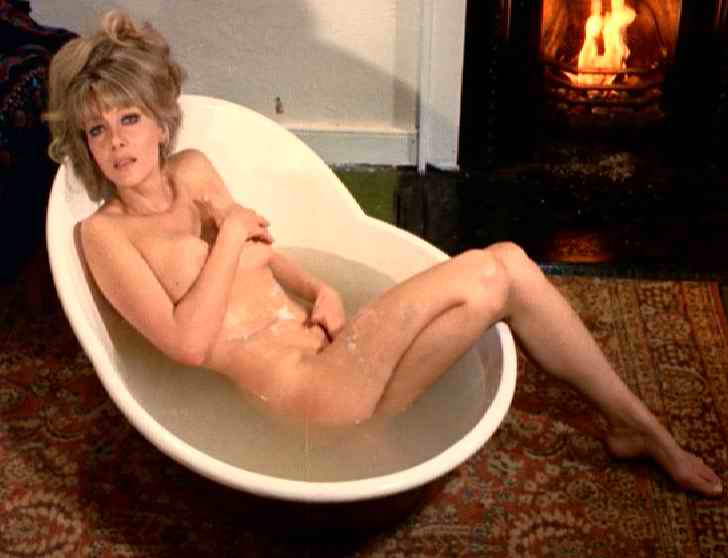"And The Apple Tree Languisheth": The Sensual Martyrdom of Neil Howie in THE WICKER MAN
There are many ways to die, but when one’s death is a sacrifice performed as a ritual of propitiation, that ending is also a beginning of sorts. For much of human history, people lived close to nature and even made natural elements into deities to be worshipped. Offering a human life in exchange for fair weather, a successful hunt, a fruitful harvest, or other aspects of survival was a common practice in the ancient world. In some cultures, being chosen for such a death was a great honor, and the occasion was a time of sacred observance and celebration. Often the person chosen was young, strong, beautiful, and loved.
The spectre of human sacrifice in horror films is becoming more visible as the folk horror renaissance takes hold. Folk horror traces its roots to films of the late occult revival, and three films stand out as the “unholy trinity” of origin: The Witchfinder General (1968), The Blood on Satan’s Claw (1971), and The Wicker Man (1973). In The Wicker Man, a film that culminates in a shocking spectacle of human sacrifice, the hero is a devout Christian whose exposure to a sexually-permissive modern pagan cult leaves him unbalanced and flustered.
Sergeant Neil Howie (Edward Woodward) is lured to the tiny island community of Summerisle north of Scotland to search for Rowan Morrison, a teenage girl who’s been reported missing. A virgin in his thirties due to his closely-held Christian beliefs, the straitlaced Howie's chaste engagement to his fiancee Mary is the subject of sniggering jokes at the police station. As Howie flies a small plane to the island we hear a solemn but beautiful Scottish song sung by a woman: “The Highland Widow’s Lament.” The song is perhaps a bit of foreshadowing of the act of human sacrifice to come later. As Howie’s plane approaches the lush landscape of Summerisle, the music shifts to a bouncy folk rendition of an old Robert Burns song, “Corn Rigs,” describing a young man’s trysts with a young woman in the fields.
At Summerisle, a remote community where the residents follow a contemporary revival of pagan worship, Howie is exposed to all manner of sensual sights and sounds: bawdy songs, young people coupling in the moonlight on the town green, lessons on fertility in nature at the school house. His indignation is only slightly more apparent than his embarrassment and his smoldering curiosity.
But Howie’s encounters with women build slowly, gradually increasing in sexual content and energy. He is first greeted at the island by a group of elderly male fishermen and the harbour master, who at first deny the existence of Rowan Morrison. His first female encounters are with Rowan’s much younger sister Myrtle and her middle-aged, rather dowdy mother May. He tries gently to ask Myrtle questions, but she only reveals that her sister is a hare. May Morrison claims she only has one daughter. Howie’s search for the teenager is met with confused denial by the villagers, a signifier that his search is a quest for the archetypal feminine, a force he has hitherto denied, given his unconsummated engagement.
On his first night in the village, Howie stays at a pub called The Green Man (the figure is a vegetation spirit of European folklore, closely related to the May King, Jack in the Green and John Barleycorn). As he waits for his dinner, the owner’s daughter Willow (Britt Ekland, a Swedish model who was famously married to pop star Rod Stewart at the time) becomes the center of a naughty song performed by men in the pub. In “The Landlord’s Daughter,” Willow’s various body parts and sexual prowess are the subject, and she laughs and dances as the men sing each verse. Howie is not amused, and passes around Rowan Morrison’s photo to inject some solemnity into the rowdy atmosphere.
When Willow brings him his meal, he complains that none of the food is fresh, noting that the canned beans are an odd shade of turquoise not found in nature. Willow replies, with a suggestive look and tone, “some things in their natural state have the most vivid colors.” Howie knows what she means and is nonplussed for a moment, as Willow asks what he wants for dessert. He asks casually for an apple, the famous import of Summerisle, and is shocked to learn they don’t have any. This is the first hint of the need for a sacrifice to the gods of the land: the crops have failed. Willow offers him peaches and cream, and he agrees, though makes a comment about the fruit being canned. Before she turns away, she says in a friendly way “Cheer up!” and then, low and sultry: “food isn’t everything in life, you know.” It’s worth noting that Howie’s biblical devotion might have him thinking of the apple as the fruit of knowledge, and temptation: Willow is the keeper of this knowledge, and she makes it her mission to tempt him.
That night, as Howie is kneeling praying by his bedside, he overhears a man calling Willow’s name in a voice. It is Lord Summerisle (Christopher Lee), dressed in a formal kilt. A handsome young man also wearing a kilt is with him. Willow leans out her bedroom window in a form-fitting nightgown. “May I present Ash Buchanan,” Summerisle says, and Willow invites him to come upstairs. As Ash enters the pub, everyone becomes silent, and as he climbs the stairs a song is performed with a guitar and a man singing, as the pub-goers tap gently on the tables in rhythm and sing harmonies on the chorus. The song is “Gently, Johnny,” a sensual call and response between a couple seducing each other.
“Another sacrifice for Aphrodite,” Summerisle says and Willow laughs, saying “You flatter me, your lordship; surely you mean, to Aphrodite?” Summerisle bows and says “You are the goddess in human form, and I merely your humble acolyte.” She blows him a kiss, and he tells her: “Enjoy yourself, and him, only remember, for tomorrow is tomorrow.” Willow responds: “The day of death, and rebirth,” to which Summerisle replies, “Yes, and of a somewhat more serious offering than tonight.”
This is, of course, all being done for Howie’s benefit, to plant ideas about the mystery of Rowan Morrison. Howie returns to his bed to try and sleep but the raucous sounds of Willow deflowering Ash can be heard through the walls. The song continues and Summerisle recites some poetry by Walt Whitman (that nature-worshipping libertine): “I think that I could turn and live with animals…” as he watches two snails entwine on a branch. The sound design is beautifully layered in this scene: there is the song being performed in the pub, the sounds of sex in Willow’s room, and Summerisle’s recitation, and we see Howie pacing and sweating as he becomes involuntarily aroused by the sounds next door.
The next morning, Howie sees Willow working outside and asks her how to get to the schoolhouse. As he approaches, a maypole dance is being performed by the boys, and their schoolmaster leads them in a song full of sexual symbols in nature. Ash Buchanan climbs the maypole and places a floral wreath on top: a clear depiction of symbolic intercourse. Howie enters the schoolhouse where a lesson is taking place: Miss Rose (yes, everyone is named after plants here, a nod to the agrarian religion they practice) is asking one of her students, Daisy, what the maypole represents. When Daisy is unable to answer, a flurry of hands go up and a dozen girls say “phallic symbol!” in one of the most unintentionally hilarious moments of the film. Howie is aghast, calling Miss Rose’s lesson “filth.” She tries to explain the principles of their beliefs to him, but he questions why they’re not taught Christianity. Miss Rose responds that the children find it much easier to picture reincarnation than resurrection, since “those rotting bodies are a great stumbling block for the childish imagination.” Here again we have a harbinger of Howie’s end, and this time his beliefs in a Christian afterlife are directly challenged. It has become clear that the tenets of Howie’s Christianity are being held up to scrutiny, even ridicule, in pagan Summerisle.
After searching the village for clues, Howie visits Lord Summerisle in his mansion. En route in a horse-drawn carriage, Howie sees a group of young pregnant women walking through an orchard, touching the branches. Nearby, a group of naked teenage girls are dancing in a stone circle, singing and leaping over a small bonfire. Howie continues watching this fertility ritual, mesmerized, as Lord Summerisle welcomes him. Summerisle comments that the girls are enjoying their divinity lesson, and Howie points out the obvious: “But-they-are-NAKED!” to which Summerisle replies “Naturally! It’s far too dangerous to jump through the fire with your clothes on.” Their tete a tete continues, with Summerisle explaining the purpose of the ritual: the girls leap over the flames, believing the god of the fire will make them fertile. When Howie calls it a “fake religion” and inquires why the children are not taught about Jesus, Howie slyly replies, “Himself the son of a virgin, impregnated, I believe, by a ghost.” Howie grows angry when Summerisle says that God is dead, and further, “he can’t complain; he had his chance, and in modern parlance, blew it.”
Summerisle takes Howie on a tour of the orchards and explains how his family came to own and run the island, how his grandfather brought back the “old gods” as a way to placate the locals, who were needed to work the fields. His father continued this tradition, teaching him to “reverence the music and the drama and rituals of the old gods; to love nature, and to fear it, and to rely on it, and to appease it when necessary.” Howie is given more clues about the part he is playing, but he’s not yet aware he’s a pawn in Summerisle’s game.
That night, after a frustrating day, Howie is lying in bed at the pub when he hears a knock. It’s Willow, naked in her room, knocking rhythmically on the wall as she sings “Hey-Ho,” a song of seduction. If it wasn’t yet clear that the film is a musical, this song eliminates all doubt. As she sings, Howie gets out of bed and comes closer to the wall, listening, captivated by her voice and the sounds she’s making. At one point the door nearly opens, but he closes it. She lays her hands on the wall between them, dancing lustily, gyrating with her hips and slapping her hands on her body so that he can hear. Howie is perspiring and breathing hard. Willow presses her naked body against the wall that Howie stands against, still singing and slapping the wall in rhythm. It’s as if he can feel her heat and movement through the wall. Willow's efforts to seduce him are very nearly successful, but at the last moment he resists and pulls away.
Howie’s virginal status is crucial for his role: a ritual sacrifice to propitiate the gods of the orchards. The following day, unable to start his plane, he’s forced to remain on the island and is now convinced Rowan will be sacrificed in the May Day ritual. In trying to save her, he is drawn into the trap waiting for him. He disguises himself as Punch, the fool, for the costumed May Day procession. As “King for a Day,” Howie is taking part in a perverse parody of his own Christian faith. Before he is sacrificed, he is stripped of his clothes and dressed in a white robe by three women (Willow, Miss Rose, and the town clerk played by Ingrid Pitt), who wash him, dry him with their hair, and anoint him with oil. Howie appeals to the crowd, reminding him they’re about to commit murder, and that their beliefs are flawed: that their crops failed because apples were not meant to be grown there, “it’s against nature.” This ironic statement sums up Howie’s existential dilemma: his own “nature” has been held in check by his rigid Christian beliefs, and his death will be a spectacle and sacrifice affirming the power and dominion of nature.
But, as he faces his untimely demise, it’s clear that something has shifted in Neil Howie. There is fear and dread, but also a heightened awareness, perhaps catalyzed by all of the sensual acts he has witnessed on Summerisle. At the hour of his death, his desperate cries are full of heat and emotion, and his sense of decorum is shattered. Lord Summerisle mentions that, because of Howie's religious devotion and beliefs, he will receive "a rare gift these days: a martyr's death." Something breaks free from Howie as he confronts his end: the passionate man he might have been. Trapped inside the wicker man, as the flames begin to rise, he has nothing left but to speak his truth.
He preaches, extemporizing in this extraordinary moment, and his words are poetic and inspired. He creates his own scripture, suffused with the imagery of the land:
“It is the Lord who hath laid waste your orchards! It is He who hath made them bare! Hold, ye husbandmen, because the harvest of the field hath perished, and the vine is dried up, and the apple tree languisheth! Even all the trees of the field are withered, because the truth is withered away from the sons of men. Desire shall fail and ye shall all die, accursed!”
Howie’s impassioned words are overtaken by the villagers singing “Summer is a comin’-in” as they swing their arms and watch the fire burn as the sun goes down. May Day, or Beltane, is the cross quarter day marking the exact mid point between spring and summer. The season shifts, and the wheel of the year turns. The blossoms will give way to fruit. In this heightened moment in time, the truths and secrets of nature are laid bare, if Howie is able to receive them. The fire consumes the animals caged in the wicker man before it reaches him, and as they burn, their bleats, howls and cries are almost indistinguishable from the sound of rutting or mating calls. Howie, covered in sweat, weeping, exhausted, looks like nothing so much as a man who has spent his passion trying to save his own life. Transformed by fire, he will return to the Great Mother, resting in Her embrace, at last experiencing the carnal ritual of the eternal return.
Bio:
Peg Aloi (@themediawitch) is a film and TV critic who’s mainly interested in writing about witches, the occult, sex, nature, color symbolism and food. She is working on her next book, The Witching Hour: Witches, Paganism & the Occult in Popular Culture.




